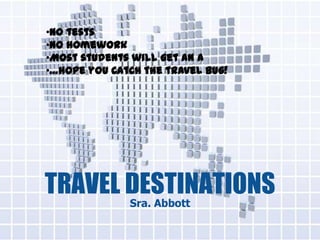
Travel destinations syllabus
- 1. TRAVEL DESTINATIONS Sra. Abbott •No tests •No homework •Most students will get an A •…hope you catch the travel bug!
- 2. Syllabus: Sra. Anita L.H. Abbott E-Mail: abbotta@lhsd.org Phone: 724.437.4741 Free Periods: 4-6-8 Disability Statement: Any student who, because of a disabling condition (physical, mental or emotional), may require some special arrangements in order to meet course requirements should contact me as soon as possible. Appropriate accommodations will be made for temporary or permanent situations. All students can be successful in this course.
- 3. COURSE DESCRIPTION Study of countries located in the Western Hemisphere including Canada, United States, Latin America, South America, Mexico and the Caribbean Islands. Emphasis on the culture, customs, climate, physical features, language, currency, tourist and seasonal attractions.
- 4. 1. The student will demonstrate knowledge of the Western Hemisphere and identify the most important travel destinations in each country and their map location. 2. The student will learn to recognize selling features and benefits of each country as a leisure and/or business destination, and identify these destinations in brochures and other reference material 3. The student will demonstrate the use of maps in conjunction with other reference material and list the relative locations of continents, oceans and seas. 4. The student will study the different time zones, identify local customs, language and courtesies of states and countries studied, and recognize the importance of fluctuating foreign currency. 5. The student will list key airports and describe the major climatic regions as they affect topography, cultures and travel.
- 5. 6. The student will discuss the relative importance of natural features and culture of each major region, country and destination. 7. The student will describe the major topographical features of the Western Hemisphere and how they affect the travel industry. 8. The student will discuss how a single destination attraction or region can accommodate numerous interests for the traveler, describe typical passenger types traveling to a given destination, and identify a standard length of stay for a first time traveler to a specific destination. 9. The student will identify geography terms and concepts that are important for the travel and tourism student to know. 10. The student will identify additional sources and reference materials for use by the travel professional, select a destination from an industry brochure and present an itinerary given a specific scenario.
- 6. Students are expected to: • be on time, find a seat, and be prepared to engage in the work of the class (e.g., taking notes, participating in questioning or group activities, etc.). • stay in class until the class is dismissed. NEVER prepare for departure before I DISMISS YOU! • stay alert throughout the class. • avoid talking with their peers while the teacher or other students are speaking. • participate until the end of class. • remain in an upright position to maintain eye contact at all time.
- 7. Students are expected to: • use good manners, be courteous and act with decorum toward their peers and anyone who may be in class facilitating the learning process. • ask questions at any time. Students are expected to raise their hands in order to participate in discussion or in raising questions. Work is expected on the date it is due. Exceptions are made only for extraordinary situations and with the approval of the teacher. • turn off cell phones and other such electronic devices during class. Exceptions are permitted only with the teacher’s prior consent.
- 8. There will be no exams; but the fill-in answers, study guides, projects will be graded almost daily. Three Make up / do-over assignments will be allowed in this course. Reasons to request a make up/ do over: failing grade of 65 or less; unable to complete assignment at assigned week. All make ups need to be completed prior to the final week of classes in order to be averaged in the final grade. Any assignment not completed will be given a grade of F, Zero points. The Midterm will be a power point group presentation that will be due no later than December 10, 2013. The last two weeks of the semester students will make group presentations to the class, using their power points and the grading rubrics for senior projects.
- 9. The Final Power Point will consist of a submitted twenty slide power point over a destination of your choice in the Western Hemisphere. The Final will be averaged into the total grade point equally with all other required assignments, and will be a group project. IN-CLASS Assignments: Students are expected to meet all requirements as outlined in the syllabus course calendar. Students should follow a rigorous schedule and work each week in this course in order to complete successfully.
